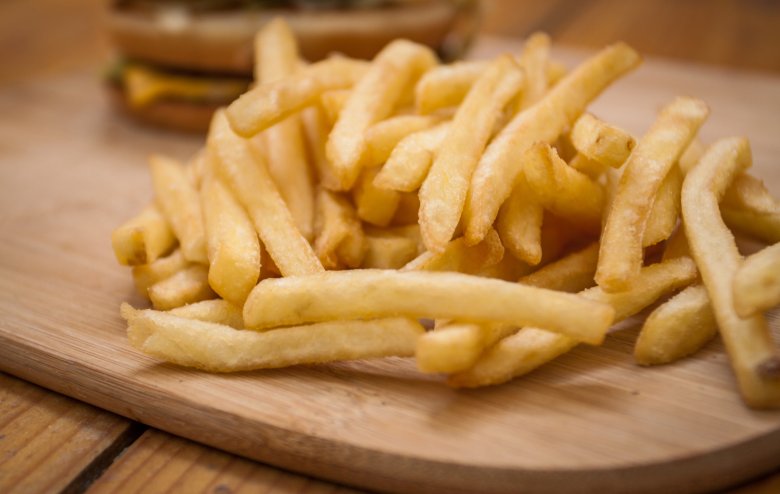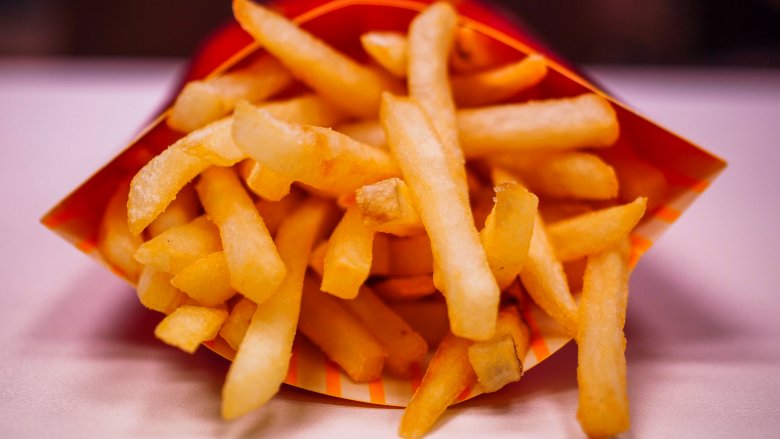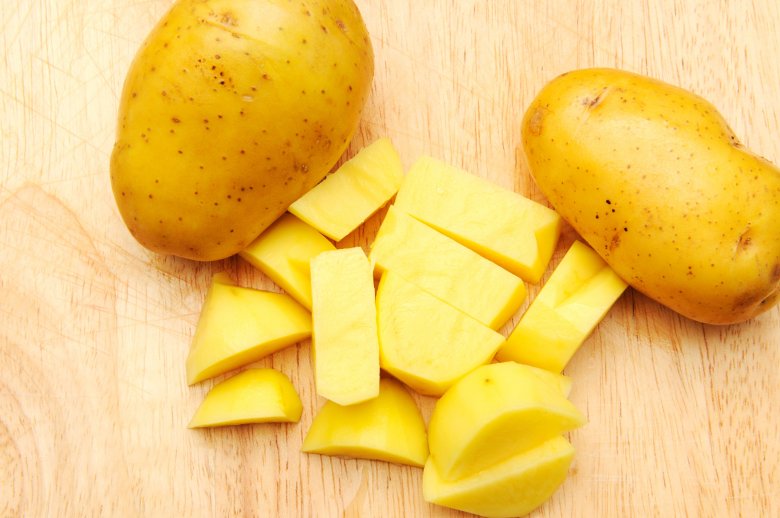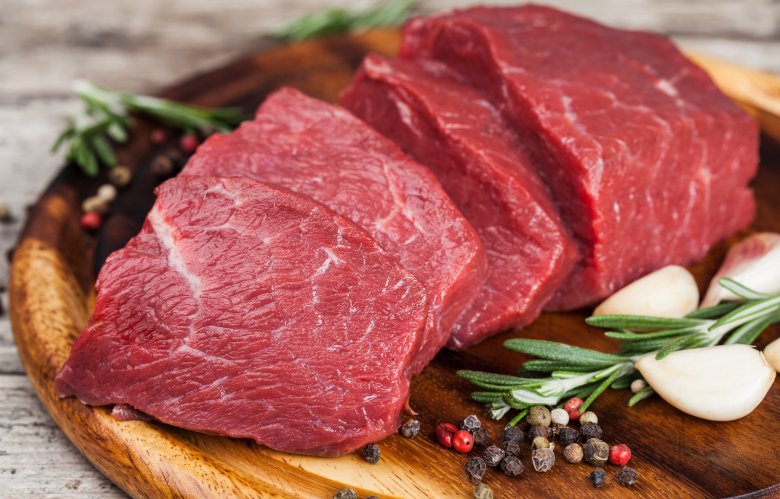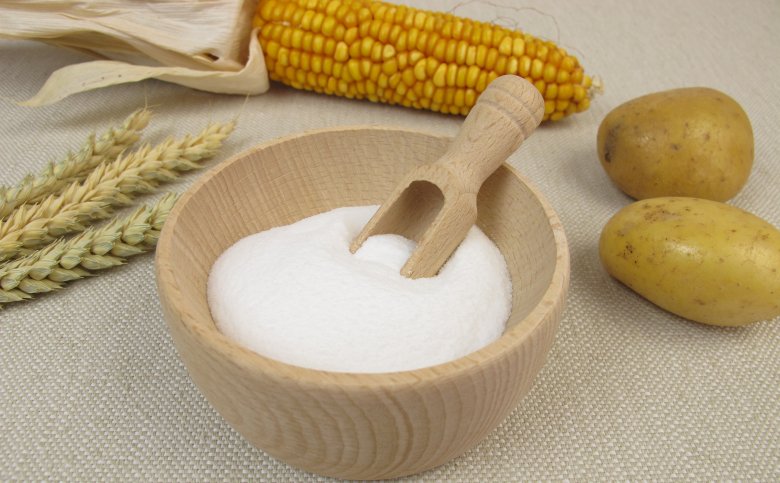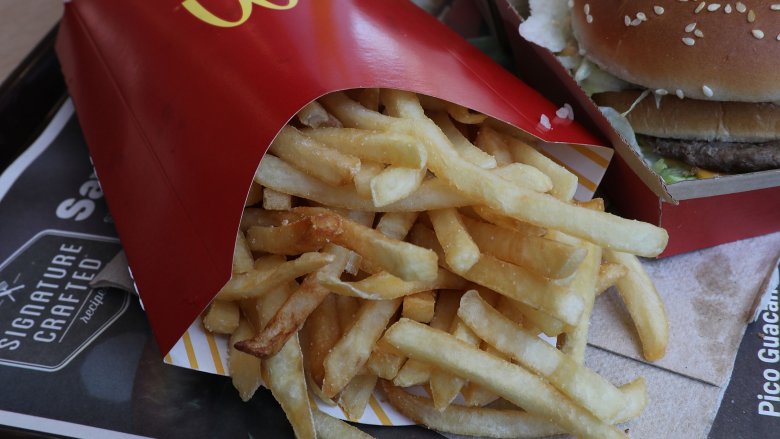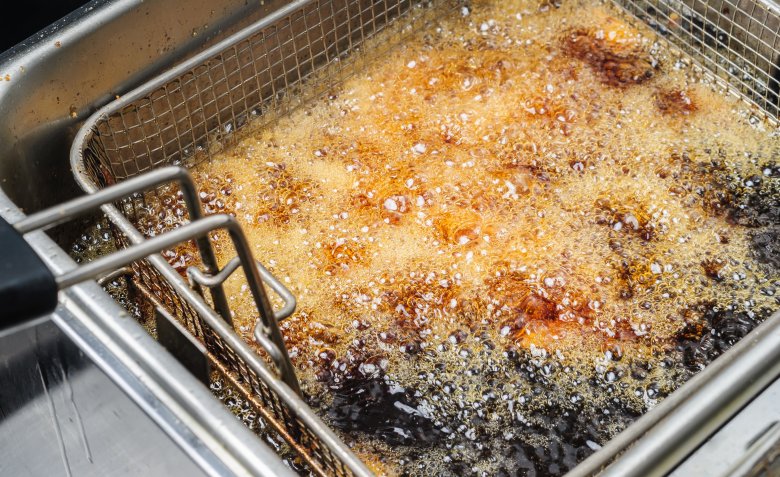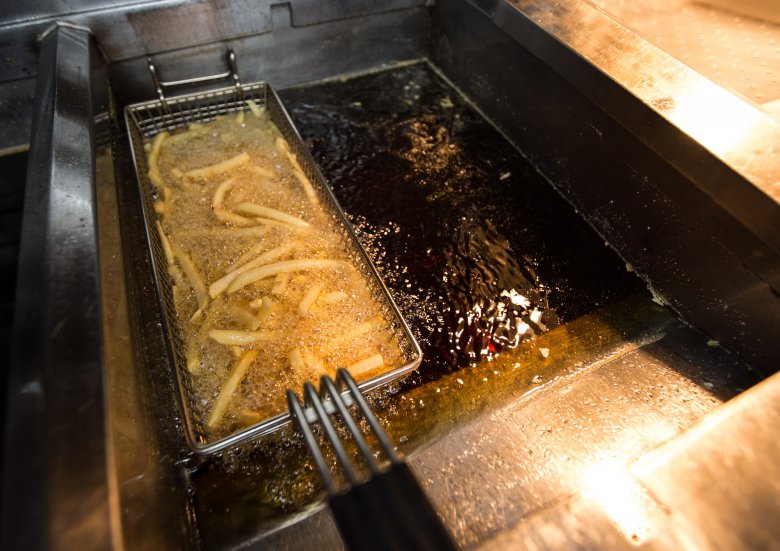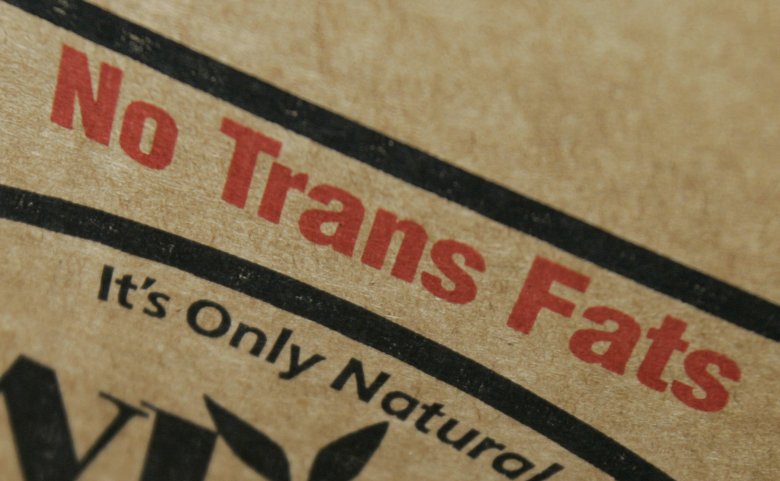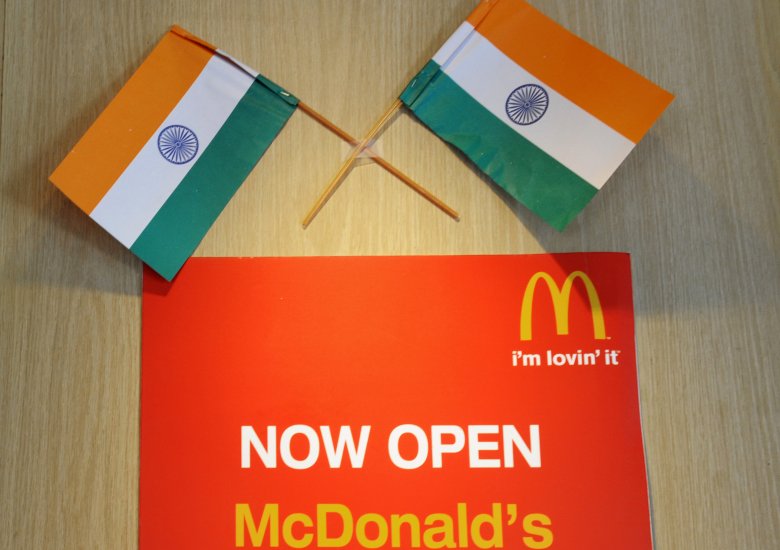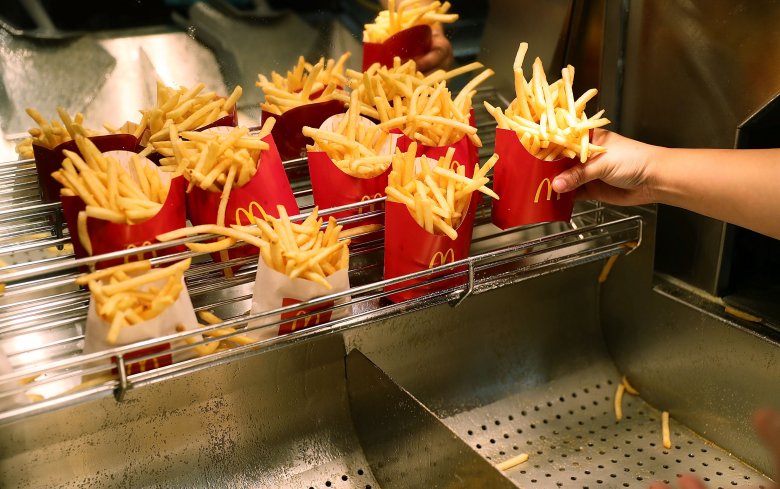What's Really In McDonald's French Fries
Let's not beat around the bush here: McDonald's is a magnificent indulgence. It's the meal of choice of the young, the tired and the nutritionally extravagant. Nobody goes into one of their locations expecting anything other than what they get — a delicious, convenient, ultimately unhealthy meal. Of course, we all tend to focus more on the 'delicious' and 'convenient' aspects, rather than the latter.
Still, for all of McDonalds' fatty burgers, questionable McNuggets, and surprisingly calorific salads, we can surely at least find solace in the fries. How unhealthy can they be? You get your potatoes, you get your salt, you add them together and deep fry them. Simple, right? Well, no. Wrong. Surprisingly to some and unsurprisingly to many, the fries that come with most of your McDonald's meals might turn out to be the most shockingly unhealthy things you'll order from them. Here's why.
The nutritional statistics
The first thing many people look at when picking up a new food is the nutritional information. Take a good look and you'll probably find that the nutritional stats of their fries are nothing short of horrifying. A medium portion of fries includes 340 calories, 16 grams of fat and 44 grams of carbs.
At first glance, that doesn't seem too bad — until you realize it's only a side dish, and is more than likely to be added to something else the restaurant produces. As a comparison, a breakfast of scrambled eggs, bacon, toast and coffee will set you back just about the same amount, as will an entire fish dinner. And that's just as a side.
The ingredients
Perhaps one of the most shocking things about the fries at McDonald's is just how much goes into them. If you're cooking fries at home, you can probably expect a very small handful of things to go into them — potatoes, oil and salt. It should come as quite a shock, then, to find that McDonald's fries have 19 ingredients in total. Yes, you'll find the potatoes, oil and salt that will go into any fries, but you're also going to come across a smorgasbord of chemicals, fats and acids.
Some of these ingredients are included for flavor, while some aid the cooking process, and others help preserve the finished product, but the simple fact of the matter is that many are unnecessary and most are incredibly unhealthy.
Beef flavoring
One of the many ingredients that are thrust into each batch of McDonald's fries is natural beef flavor. This was introduced once the restaurant put an end to cooking their fries in actual beef fat. Beef flavoring itself — the exact ingredients of which aren't required to be disclosed by the companies who make it — doesn't technically qualify as an ingredient, according to the FDA. You can be sure, however, that they contain a whole host of things, none of which are guaranteed to come from beef at all. Expect yeast, proteins and beef stock, but don't expect any actual beef.
And no, in case you're wondering, the artificiality of McDonald's beef flavoring doesn't make it suitable for vegetarians. In 2001, the company was sued for trying to insinuate that was the case.
Dextrose
According to McDonald's, dextrose, a form of sugar, is added to their fries because the way their potatoes are par-cooked removes any natural sugars, necessitating the inclusion of a dextrose solution to "help our fries achieve the uniform golden appearance they are known for after cooking." So yes, it pretty much colors the fries.
The dextrose is sprayed onto the fries before cooking to keep them looking golden. Dextrose sugar is actually commonly used in baking, and constitutes one of the ingredients of McDonald's fries which remains uniform around the world, even in the countries which use far fewer of the questionable ingredients that are utilized in the USA.
TBHQ
TBHQ, otherwise known as tertiary butylhydroquinone, is a chemical preservative which is used to extend the storage life of many foods. Unsurprisingly, considering you'll find it in most processed foods, it's one of the many ingredients included in McDonald's fries. While it may not be outwardly toxic for humans to consume, the health effects of TBHQ may be significant — it may lead to vision disturbances and other largely undesirable side effects. Fortunately for fries lovers, most of the side effects tend to come with doses much higher than you'll find in your favorite starchy side. The FDA strongly regulates the amounts of TBHQ that can be added to foods, meaning those tasty fries are well within safe limits.
Polydimethylsiloxane
Polydimethylsiloxane (as difficult to type as it is to read, trust us) is a form of silicone which is used across a wide range of industries, including the production of skin care products and silly putty. McDonald's uses it as an anti-foaming agent, the idea being that it's added to the cooking process to prevent the oil from spitting and bubbling.
Legally, there's nothing untowards about adding polydimethylsiloxane to food, with the FDA approving it as an acceptable additive, and you'd be hard-pressed to find a major fast food chain in the USA that doesn't use it. It's even relatively environmentally friendly, despite being non-biodegradable, and can be degraded using various clays or in water treatment centers. We'd probably stop short of calling it a necessary evil, however — it's certainly curious that international branches of McDonald's don't actually use polydimethylsiloxane themselves.
Everything else
Citric acid is probably one of the more unassuming ingredients in McDonald's fries, considering you've likely come across it in more than a few types of fruit. Well, it's not quite citric acid itself that's added to fries — rather, it's a citric-based antioxidant that's used to boost the shelf-life of various fried foods.
Then you've got your hydrolyzed wheat and milk, the former of which is used in hair products and the latter of which is used in baby formula. These are used in tandem with the beef flavoring to give fries their taste, and, unsurprisingly, make McDonald's fries unsuitable for anyone intolerant to wheat or dairy.
How they're made
The cooking process for McDonald's fries goes something like this. First, the potatoes (which are non-GMO) are peeled and cut into their distinctive stick-like shape. The naturals sugars are removed in a process known as 'blanching,' before being doused in some of those chemicals we've mentioned, including dextrose and sodium acid pyrophosphate. Here, the fries get their color. They're then partially fried in oil (more on that later) and the beef flavor and hydrolyzed wheat and milk is added.
After this, the fries are frozen and shipped to the restaurants, where they're fried in more oils — and this is where the TBHQ is added, too. After they're cooked, salt is added and the fries are served up to the customer.
Trans fats
One of the least healthy aspects of these fries lies in the hydrogenated soybean oil in which they're fried. This oil facilitates the inclusion of trans fats into the cooking process. Trans fats, of course, are exactly as bad as their reputation suggests, and a diet high in trans fats can lead to cholestorol problems, heart disease and strokes.
McDonald's came under particular scrutiny just over 10 years ago, when it was revealed that the fatty content of their fries was far greater than previously thought. Today, hydrogenated oils are still used in the fries, so these trans fats aren't going anywhere, and as long as they're included in the recipe, you can be sure that you're not doing yourself any favors by eating them.
International variations
Perhaps the most damning indictment against McDonald's fries, and the extravagant pointlessness of many of their ingredients, is the simple fact that most of the things you'll find in them aren't even used in most branches outside the US. According to McDonald's, their India branches use only potatoes, salt, vegetarian palm olein oil to fry in and a small amount of dextrose. The same is the case in the UK, where McDonald's points out that non-hydrogenated oils are used in the cooking process. In branches across the world, including Australia, Denmark and Israel, McDonald's uses canola oil to make their fries, again minimizing the need to include trans fats. The corporation may insist on the need to use the ingredients it does, but it says a lot that pretty much every other country refuses to do the same.
Should you eat them?
As with so many other luxuries, especially when it comes to your diet, the answer is a resounding 'sometimes.' Moderation is key, here — going out now and getting some fries in with your meal isn't going to kill you. The chemical ingredients are all FDA approved, and even the worst thing about them (trans fats) isn't outright dangerous.
Piling on the fries — or any other McDonald's food for that matter — in considerable excess is, of course, far more likely to kill you. The long-term effects of many of those ingredients are risky at best, and the nutritional value of the fries is basically nil. And that's to say nothing for what trans fats can do to you. Consume with care.
